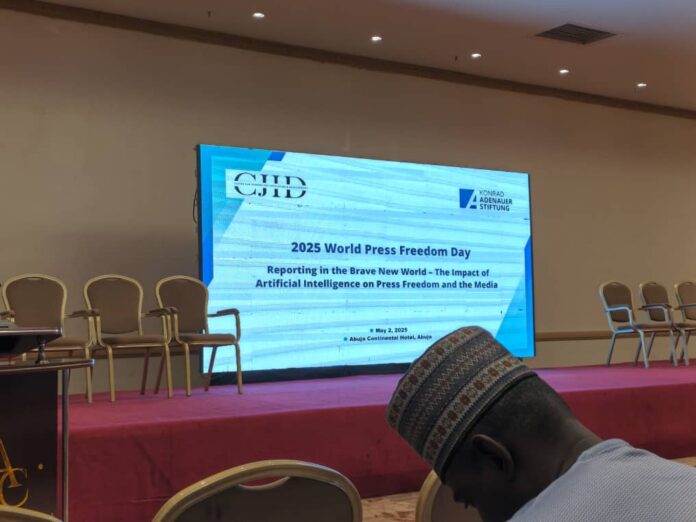By Oyeyemi Abolade
In a show of commitment to press freedom and innovation, media experts, lawmakers, and technology advocates converged at the Continental Hotel, Abuja, to mark the 2025 World Press Freedom Day.
The event, held on May 3 and organised by the Centre for Journalism Innovation and Development (CJID) in partnership with Konrad-Adenauer-Stiftung (KAS), explored the intersection of artificial intelligence and journalism.
Panel discussions focused on pressing issues such as the rise of misinformation, AI integration in newsrooms, and strategies for safeguarding journalists in the digital age. Speakers underscored the need for widespread media literacy and ethical AI deployment to preserve the integrity of journalism.
Marija Peran, Resident Representative of KAS Nigeria, opened the conference with a powerful statement: “AI must serve the truth, not distort it.” She emphasized that World Press Freedom Day should be a call to action to uphold truth and democracy in an increasingly digital world.
Representing the Minister of Information and National Orientation, Mohammed Idris, Dr. Sulaiman Haruna, Director of Press at the ministry, announced the establishment of a UNESCO-backed Media and Information Literacy Institute at the National Open University of Nigeria. The institute aims to equip citizens with the skills to navigate and assess media content critically, especially as AI continues to influence news production. It is envisioned as a global hub for ethical journalism and democratic dialogue.
CJID’s Executive Director, Akintunde Babatunde, acknowledged AI’s dual nature—its potential to enhance storytelling and its risks, including censorship, targeted attacks, and journalist burnout.
He called for greater support from local and international partners to strengthen press freedom.
Honourable Akintunde Rotimi Jr., Chairman of the House Committee on Media and Public Affairs, advocated for deeper collaboration between lawmakers, journalists, and civil society.
He highlighted journalists as essential contributors to national development.
“Artificial intelligence undeniably offers great promise—accelerating reporting, improving verification, and expanding reach,” he noted.
“However, it also poses serious risks: amplifying biased data, threatening editorial independence through automation, and fuelling the rapid spread of misinformation.”
Echoing these concerns, Dr. Haruna reiterated the government’s commitment to the ethical use of AI, enhanced journalist training, and robust media literacy initiatives to counter fake news and digital threats.




